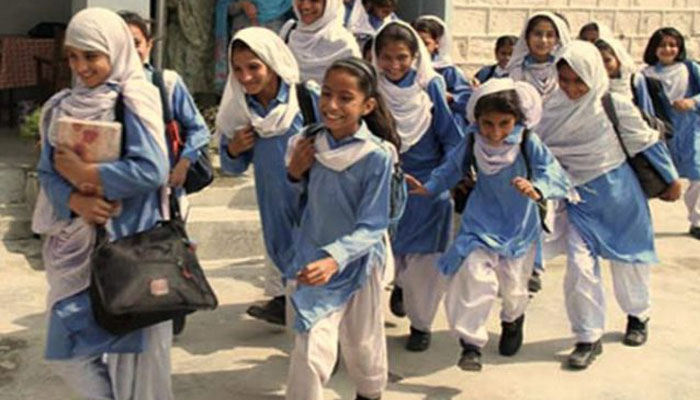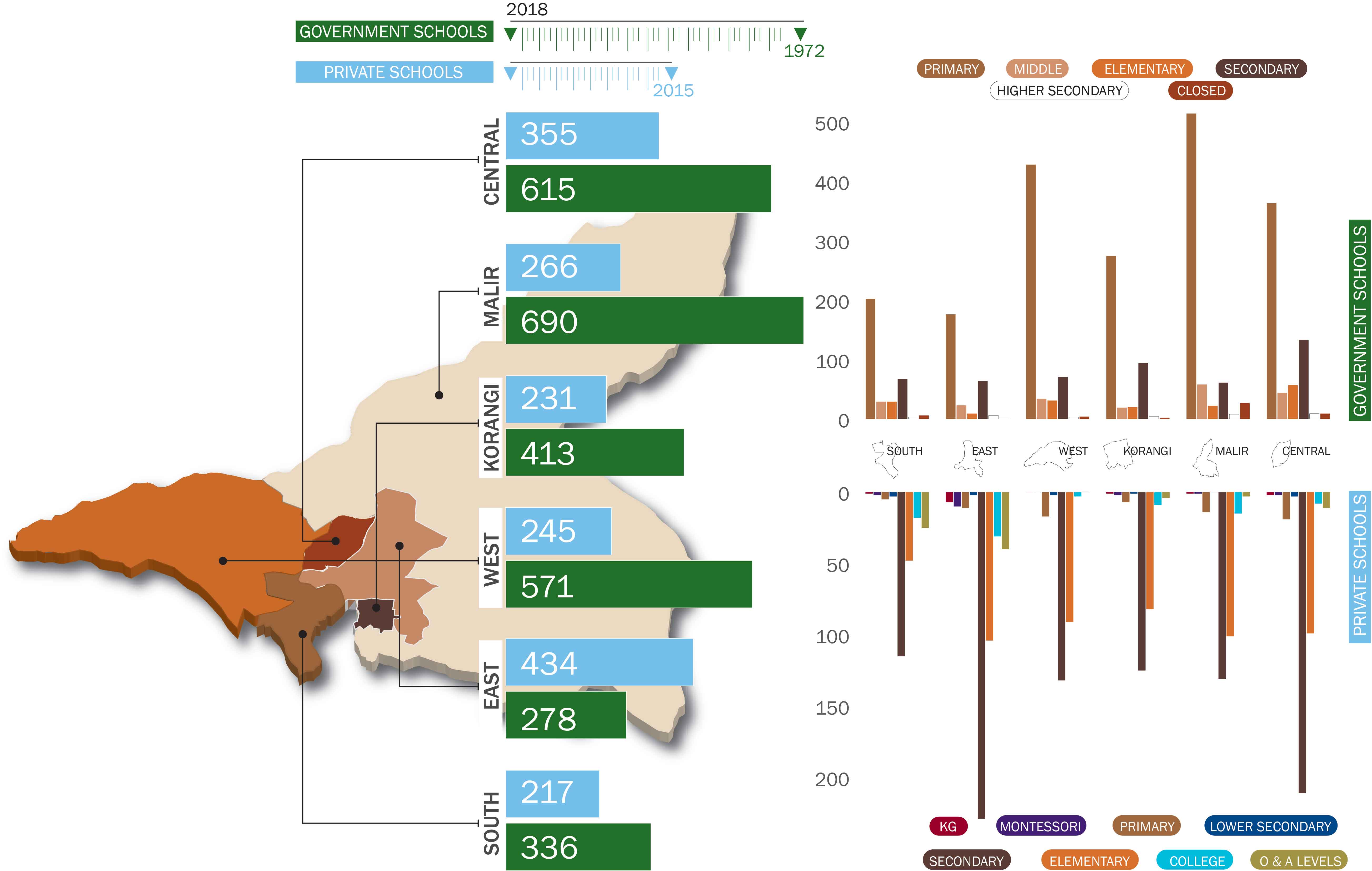Quality education has become an expensive dream, thanks to government
Mumtaz Ali Shah, 34, holds a menial job at a government primary school in Karachi’s Gulshan-e-Iqbal neighbourhood. After work he picks up his 11-year-old daughter Noreen and eight-year-old son Hassan from a nearby private school.
Shah’s five-member family depends entirely on the Rs25,000 a month he receives from the School Education & Literacy Department (SELD). But he is committed to sending his kids to private school. To that end he spends an annual Rs100,000, which comes to a third of his salary.
As the sole breadwinner it is difficult for him to manage the school fees, the house rent, the utility bills and everyday expenditures. But his only aim in life is to ensure that his children receive quality education from a private school so they can have bright futures.
While enrolling his kids in school, he never considered a public institute, even though he is employed at one. “It’s a fact that private schools are well-managed and better than government ones,” Shah told The News. “I just want my children to study science and get good jobs, unlike me.”
However, he is not the only employee of the education department who thinks that public schools are not functioning up to par. Majority of SELD employees believe that only studying at private schools can ensure bright futures for their kids.
This feeling, though not wrong, has led the public sector educational system towards its decline, while private institutes are cropping up everywhere across the metropolis. Educationists say that making good choices for your children is one of the major responsibilities of a parent. They believe that public education has been paralysed and cannot ensure bright futures for kids.
“The only way to restore parents’ trust in public education is to turn government schools into ideal institutes,” said Zakia Anis, general secretary of the Pakistan Educational Forum. She said that political interference, especially in the teacher recruitment process and postings and transfers, and centralisation of powers have rendered government schools worthless. “Until the revival of the entire public education system, we should not dream of better futures for our children at government schools.”
Dr Kamal Haider, dean of education at the Federal Urdu University of Arts, Sciences & Technology, said Article 25A of the Constitution clearly says that the state will provide free and compulsory education to all children between the ages of five and 16.
“But parents are compelled to opt for private education because public schools lack even the most basic facilities and fail to provide quality education. Sometimes parents appear to be competing with each other over the enrolment of their kids in better schools.”
He claimed that even though they can barely afford even low-cost private schools, the parents want to project that they come from better socio-economic backgrounds than others, which fuels the upsurge of private schools.
However, he pointed out, privately managed educational institutes cannot be blamed for the prevalent situation when public schools are not being effectively operated, leaving a vacuum to be filled by better alternatives.
“As the number of private schools keeps increasing, with more and more parents choosing them for their children, the confidence of the lesser privileged classes in the public education system is on a sharp decline. This is an alarming trend, as most of these families can’t afford private schools.”
The relevant data available with The News reveals that none of the students of public schools have been able to secure any of the top 50 positions in the matriculation examinations in the past eight years.
This not only discourages parents from enrolling their children in public schools but also exposes the weaknesses of the government’s education policy, even though the provincial administration has spent billions of rupees in this sector.
Eyebrows have been raised because of the data of the education department, raising questions about the reliability of public education. Right now only 2,903 government schools are functioning in Karachi, the city which houses 15.9 million people. However, many public schools in the settled areas were set up by private individuals, and the government took over these institutes under the nationalisation policy in 1972.
Since education became a provincial subject under the 18th constitutional amendment, the Sindh government has also been paying the rent for a number of public schools housed in those nationalised buildings.
On the other hand, the private sector has set up 1,748 schools across the metropolis in the past three years. This does not include the hundreds of unregistered institutes that are operating all over the city.
“It’s government policy to build schools only in regularised areas, which is why the institutes functioning under the education department are fewer than private ones,” said Dr Baela Raza Jamil, public policy specialist and director of the Idara-e-Taleem-o-Aagahi. She, however, is of the view that the private sector is playing an important role in the promotion of education.
SELD media coordinator Saeed Memon told The News that education is a competitive field, so “if we don’t work on our product, it will be unsalable”.
In a meeting last month, Education Minister Syed Sardar Ali Shah had conceded that the government does not own public schools, which has severely affected the educational fabric of the province. Earlier this month, during a discussion in the Sindh Assembly, Shah said if every lawmaker were to adopt one school each, 168 institutes across the province can be turned into model schools. Many MPAs argued that no public school in Sindh offers quality education.
Last October, then education minister Jam Mehtab Hussain Dahar had claimed that all the civil servants’ children would go to public schools instead of private ones, saying that the provincial government would formulate a law to make it happen. But nothing has been done about it since.
Minister Sardar Ali Shah’s recent step, however, of enrolling his only daughter in a state-run school in Hyderabad is an encouraging sign, as it is likely to persuade government employees like Mumtaz Ali Shah to enrol their children in public schools.
-
 James Van Der Beek's Quiet Sacrifice Before Death Comes To Light
James Van Der Beek's Quiet Sacrifice Before Death Comes To Light -
 Suspect Kills Six Across Florida Before Taking His Own Life
Suspect Kills Six Across Florida Before Taking His Own Life -
 AI Helps Researchers Identify 2,000-year-old Roman Board Game Stone
AI Helps Researchers Identify 2,000-year-old Roman Board Game Stone -
 Inside Kate Middleton, Prince William’s Nightmare Facing Andrew Mountbatten-Windsor
Inside Kate Middleton, Prince William’s Nightmare Facing Andrew Mountbatten-Windsor -
 Margaret Qualley Shares Heartfelt Confession About Husband Jack Antonoff: 'My Person'
Margaret Qualley Shares Heartfelt Confession About Husband Jack Antonoff: 'My Person' -
 Savannah Guthrie Shares Sweet Childhood Video With Missing Mom Nancy: Watch
Savannah Guthrie Shares Sweet Childhood Video With Missing Mom Nancy: Watch -
 Over $1.5 Million Raised To Support Van Der Beek's Family
Over $1.5 Million Raised To Support Van Der Beek's Family -
 Paul Anthony Kelly Opens Up On 'nervousness' Of Playing JFK Jr.
Paul Anthony Kelly Opens Up On 'nervousness' Of Playing JFK Jr. -
 Diana Once Used Salad Dressing As A Weapon Against Charles: Inside Their Fight From A Staffers Eyes
Diana Once Used Salad Dressing As A Weapon Against Charles: Inside Their Fight From A Staffers Eyes -
 Video Of Brad Pitt, Tom Cruise 'fighting' Over Epstein Shocks Hollywood Fans
Video Of Brad Pitt, Tom Cruise 'fighting' Over Epstein Shocks Hollywood Fans -
 Jelly Roll's Wife Bunnie Xo Talks About His Huge Weight Loss
Jelly Roll's Wife Bunnie Xo Talks About His Huge Weight Loss -
 Margot Robbie Reveals Why She Clicked So Fast With Jacob Elordi
Margot Robbie Reveals Why She Clicked So Fast With Jacob Elordi -
 Piers Morgan Praised By Ukrainian President Over 'principled Stance' On Winter Olympics Controversy
Piers Morgan Praised By Ukrainian President Over 'principled Stance' On Winter Olympics Controversy -
 Halsey's Fiance Avan Jogia Shares Rare Update On Wedding Planning
Halsey's Fiance Avan Jogia Shares Rare Update On Wedding Planning -
 Instagram Head Adam Mosseri Says Users Cannot Be Clinically Addicted To App
Instagram Head Adam Mosseri Says Users Cannot Be Clinically Addicted To App -
 James Van Der Beek Was Working On THIS Secret Project Before Death
James Van Der Beek Was Working On THIS Secret Project Before Death





